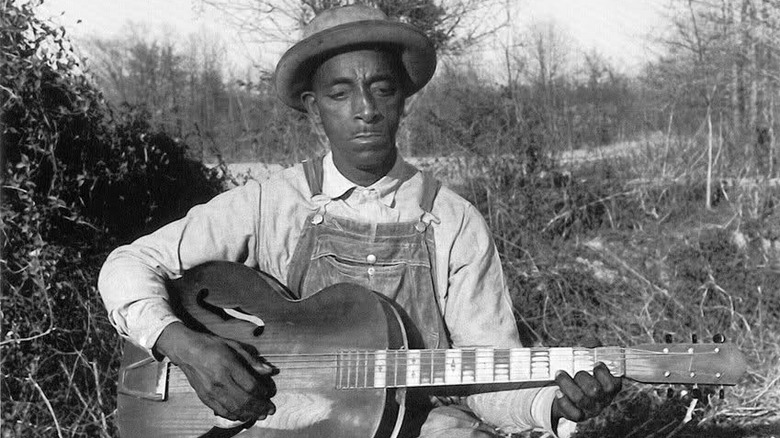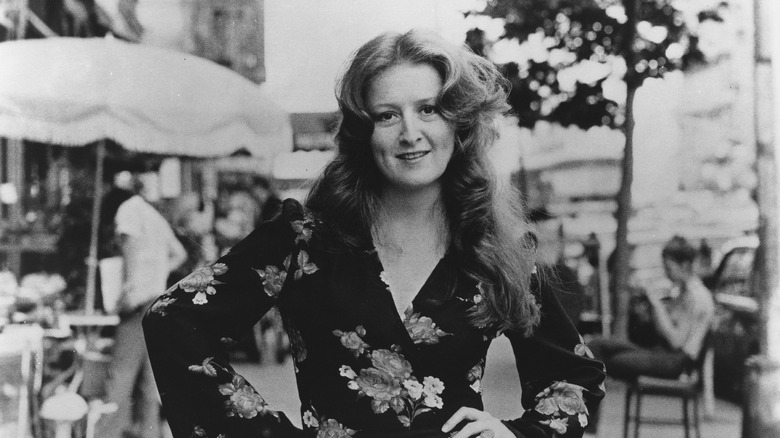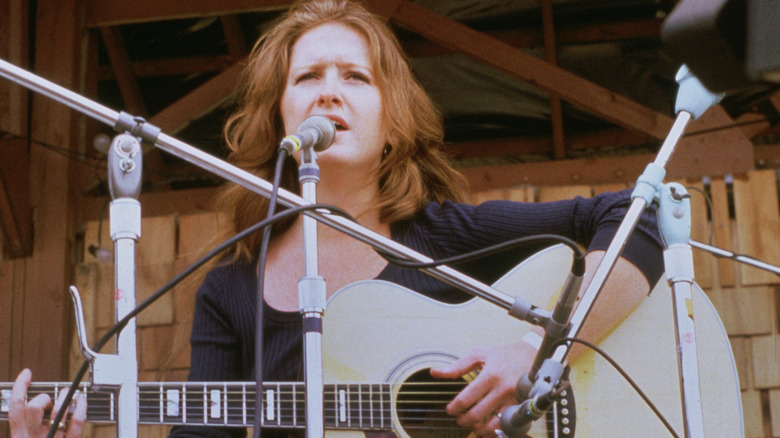Bonnie Raitt's Friendship With Fred McDowell Explained
If you are looking for a lesson in patience and persistence, you couldn't do better than the story of virtuoso blues artist Bonnie Raitt, whose journey to stardom was a famously slow ascent.
Having dropped out of an Ivy League education while still in her teens in 1969, the blues-obsessed Californian became a growing presence on the East Coast's bustling blues and folk scene, according to Britannica. However, though Raitt worked with some of the biggest names in the business and attracted critical plaudits from the moment she released her self-titled debut album on Warner Bros. Records in 1971, it wasn't until two decades later that she broke into the mainstream. Raitt's ascent came thanks to a string of platinum-selling albums beginning with 1989's "Nick of Time," which turned her into a household name.
From the very dawn of her career, Raitt was lucky enough to form close friendships with some of the most influential blues players of all time, such as John Lee Hooker, whom she counted as a lifelong friend, and with whom she collaborated on the Grammy Award-winning "I'm in the Mood" in 1990. She was also close with Mississippi Fred McDowell, the innovative slide blues guitarist who mentored the young singer while she was still a teen would become instrumental to her sound throughout her career. Here is the story of Bonnie Raitt and Fred McDowell.
Bonnie Raitt's first brush with greatness
Bonnie Raitt's association with the legendary Mississippi Fred McDowell began when she was just 18. According to Raitt's biography, "Just in the Nick of Time," written by Mark Bego, Raitt made her first connections in the blues scene through Dick Waterman, a 33-year-old blues promoter and talent agent who would later have a romantic relationship with the 18-year-old.
Waterman had a passion for rekindling the careers of semi-forgotten blues artists. including Mississippi Fred McDowell at the end of the 1960s. Raitt first became friends with McDowell as an artist opening shows curated by Waterman, and soon McDowell, who was then in his late 60s, became the young musician's mentor. "I loved his sense of humour, and what I most got out of him was the passion that he played," Raitt said (via Confessing the Blues). "He used to just throw his head back and lift his knee up, take that slide guitar all the way up the neck. And I would just watch transfixed, because at that point, I had only heard records. Then when I met Fred and got to see him live, I was just blown away by the power of one guy and a guitar to just hit so many emotions."
Bonnie the bottle carrier
Bonnie Raitt has described how at the start of her career, she was something of a nurse for a number of aging blues musicians rather than a fellow musician. However, rather than medication or care, Raitt's task was to hand out alcohol — in the right quantities — to the icons she supported during Dick Waterman's East Coast Blues shows. "I carried the booze bottles for all those guys," Raitt told her biographer Mark Bego. "Like, I know that Fred McDowell could have two of these gins before he went on; and an hour before the show, Son House could have his bottle of vodka. And if he had any more, he would forget the words. And if he had any less, he would forget the words."
Raitt added: "[I]f you just gave somebody a bottle in the dressing room, they'd be passing it around, and everybody would be completely 'faced' by the time they were supposed to go on." Bego notes that Raitt's immersion into the elder bluesmens' drinking culture was markedly different from many of her peers playing, for example, acid rock or folk, who by the late '60s were experimenting with psychedelics and other drugs. Unfortunately, alcohol would soon have repercussions for Raitt's own fledgling career.
The death of Fred McDowell
Bonnie Raitt's sophomore album, "Give it Up," was released to critical acclaim in 1972. By this time, Raitt was already an established political activist, and the liner notes dedicate the LP to the people of Vietnam — whose plight was close to her heart — but also to "the loving memory of a dear friend," that of her great mentor, Fred McDowell (via Mark Bego's "Just in the Nick of Time"). McDowell had died of cancer on July 3 of that year at the age of 68, according to The New York Times. His obituary noted the musician's popular resurgence in his final years, a twilight success helped in part by the efforts of Dick Waterman and, as a supporting artist and friend, Bonnie Raitt.
Per "Just in the Nick of Time," Raitt and McDowell had planned to record a duet together of the McDowell classic "Kokomo" for inclusion on the album but were unable to complete it before his death. According to Waterman, what upset Raitt most about McDowell's passing was that they had lost the opportunity to promote the ender bluesman even further. "[I]t hit her really hard," he told Bego. "It was almost as if she was angry that they just didn't have a little more time — she could have done it for them. As her popularity was climbing and helping them was a real motivation, those men just ran out of days."
Bonnie Raitt's tribute to Fred McDowell
Though their association had lasted only a few short years, Fred McDowell had a lasting effect on Bonnie Raitt, and their friendship became a touchstone to the roots of the genre throughout the musician's long career. "I think I just fell in love with the blues as deeply as I ever was going to get with Mississippi Fred McDowell," Raitt said (via Confessing the Blues).
In lieu of the duet that was slated to be recorded prior to McDowell's death, Raitt's next album, 1972's "Takin' My Time," featured a medley of two blues classics made famous by McDowell, "Write Me a Few of Your Lines/Kokomo Blues," which became a perennial feature of her live shows for decades after. Raitt began performing the medley almost immediately following McDowell's death, as shown by the 1973 release of "Ann Arbor Blues & Jazz Festival 1972. The live recording of the event also featured Raitt's "Tribute to Fred McDowell," which — as well as the two songs listed above — also incorporates Sleepy John Estes' "Drop Down Mama," another McDowell favorite that Raitt plays in the late bluesman's classic slide guitar style (via Second Hand Songs).
Emulating her hero
It's no great secret that Bonnie Raitt was emulating and reinterpreting the work of her great mentor Fred McDowell and bringing his influential style of slide guitar to a new audience. But in the years following McDowell's death, Raitt found herself taking on another aspect of his blues persona: his alcoholism. Raitt had seen how central drinking liquor was in the lives of the older generation of blues artists such as McDowell, and also how totally their level of consumption could affect their performances on any particular night. However, rather than avoid alcohol as a potential pitfall to a budding blues career, Raitt embraced it as a seemingly integral part of the genre's culture.
"I wanted to be the female version of Muddy Waters or Fred McDowell," Raitt told her biographer Mark Bego. "There was a romance about drinking and doing blues. These blues guys have been professional drinkers for years, and I wanted to prove that I could hold my liquor with them. I bought into that whole lifestyle." As the years rolled on, Raitt began to struggle with drug and alcohol addiction, with her career eventually slumping in the mid-80s, according to Rolling Stone. She entered recovery in 1987, three years before her commercial breakthrough.
If you or anyone you know is struggling with addiction issues, help is available. Visit the Substance Abuse and Mental Health Services Administration website or contact SAMHSA's National Helpline at 1-800-662-HELP (4357).





